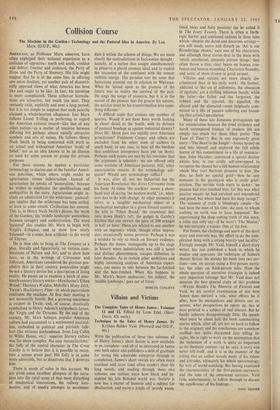Collision Course
AMERICANS, as Professor Marx observes, have often explaiped their national experience as a collision of opposites: north and south, creditor and debtor, frontier and seaboard, the Party of Hope and the Party of Memory. His title might suggest that he is in the same line, in offering one more dualism, yet another pair of diametri- cally opposed views of what America has been like and ought to be like. In fact, his intention is more complicated. These either-or formula- tions are attractive, but much too neat. They certainly exist, explicitly and over a long period; but it is too simple to suppose that each polarity claimed a whole-hearted allegiance. Leo Marx follows Lionel Trilling in preferring to regard the American cultural record—like that of any other nation—as a matter of tensions between differing but perhaps almost equally attractive symbols and sets of values. He follows Henry Nash Smith in being concerned with myth as an actual and widespread American `mode of belief,' not as an idea known to be an illusion or used by some person or group for private purposes.
For these reasons he applies a particular terminology to discuss one of the familiar Ameri- can polarities, which others might render as agrarianism versus industrialism. Instead of agrarianism he speaks of `pastoralism,' because he wishes to emphasise the qualifications and ambiguities in the story. Agrarianism might in- clude an admiration for the wilderness: pastoral- ism implies that the wilderness has been settled, at least to some extent. Civilisation has entered. This is, in Henry Nash Smith's phrase, the 'myth of the Garden,' the 'middle landscape' somewhere between savagery and sophistication. The word 'pastoral' also enables Mr. Marx to begin with Virgil's Eclogues, and to show how nicely balanced—in a sense, how artificial—is the world of Tityrus.
He is then able to bring in The Tempest as a play, literally and figuratively, on various com- binations of Nature and Art; and to show how later, as in the writings of Crevecceur and Jefferson, Americans considered the glorious pos- sibility that in their country pastoralism might be not a literary device but a description of living reality. He passes on to examine a batch of nine- teenth-century literary works—Hawthorne's 'Ethan Brand,' Thoreau's Walden, Melville's Moby Dick, Twain's Huckleberry Finn=in which pastoralism confronts the machine. At first their meeting is not necessarily hostile. But a growing uneasiness is evident in Twain, and, of course, drastically symbolised in Henry Adams's antipathetic forces, the Virgin and the Dynamo. By the end of the century, Mr. Marx believes, popular American culture had succumbed to a sentimental pastoral- ism, embodied in political and patriotic folk- lore (the virtuous husbandman, from Log Cabin to White House, etc.): superior literary culture was far more complex. No easy reconciliations: the folly of the central character in The Great Gatsby is to believe that it is possible to recap.; ture a serene green past. His folly is in some ways admirable, but so disastrous that it destroys him.
There is much of value in this account. We are given some excellent glimpses of the intru- sion into the rural scene of that most disturbing of mechanical innovations, the railway loco- motive, and of sundry attempts to accommo- date it within the scheme of things. We see more clearly the contradictions in Jacksonian thought: namely, of a nation that sought simultaneously to preserve a placid yeoman ideal and to exploit the resources of the continent with the utmost ruthless energy. The paradox was the same that Santayana pointed out in relation, to Whitman. What he 'seized upon as the promise of the future was in reality the survival of the past. He sings the songs of pioneers, but it is in the nature of the pioneer that the greater his success, the quicker must be his transformation into some- thing different.'
A difficult topic that arouses any number of queries. Would it not have been worth looking in closer detail at the South, with its defence of pastoral bondage as against industrial slavery? Does Mr. Marx pass too rapidly over American 'primitivism? Fenimore Cooper and others are excluded from his select team of authors (a small band, in any case, to bear all the burdens that ambitious interpreters have put on them). Perhaps such points are met by his reminder that the argument is selective: we are offered only some versions of American pastoral. Still, other uncertainties remain. Is the terminology ade- quate? Would any terminology suffice?
It was, after all, not the Industrial but the American Revolution that drove Crevecceur from his farm. At times 'the machine' seems a short- hand way of saying 'the modern world,' i.e., what- ever has to do with change. At other moments it refers to a tangible mechanical object or a mechanical metaphor in a given literary context: the kiln in 'Ethan Brand,' the steamboat that runs down Huck's raft, the gadget in Gatsby's kitchen that can extract the juice of 200 oranges in half an hour. These are related to one another with an ingenuity which, though often impres- sive, occasionally seems perverse. Perhaps it was a mistake to rely so much on literary evidence. Perhaps the theme, manageable up to the stage in history when industrialism was still a novel and distinct phenomenon, escapes definition in later decades. As in certain other ambitious and highly interesting analyses of American experi- ence, one seems to veer between the far-fetched and the near-fetched. When this happens in Mr. Marx's brave endeavour, his subject, the `middle landscape,' goes out of focus.
MARCUS CUNLIFFE






































 Previous page
Previous page